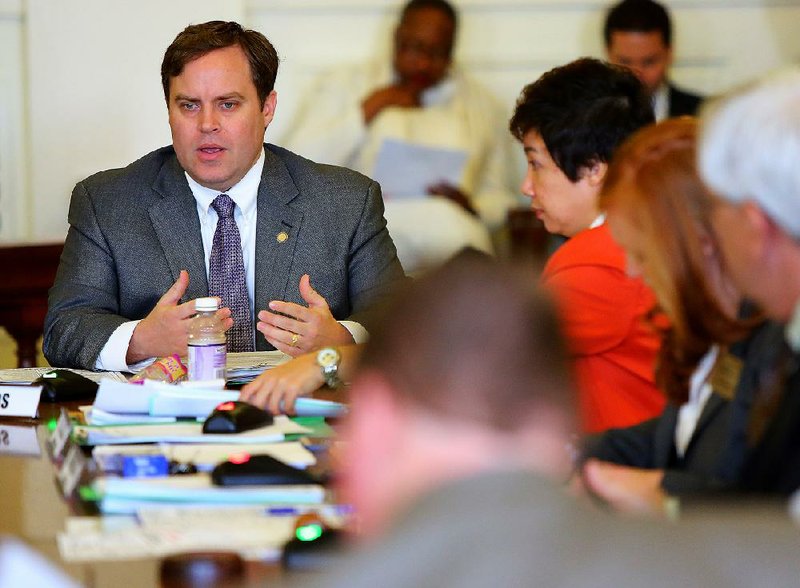A Carroll County mayor, who serves on the Northwest Arkansas Economic Development District board, said his city received a $25,000 state grant in 2014 after he dropped his objections to awarding $200,000 in state money to a private college in Springdale.
Berryville Mayor Tim McKinney said the grant to his city was offered by then-state Sen. Jon Woods, R-Springdale. He said Woods visited him in Berryville and persuaded him to drop his opposition to giving the state money to the college for a land purchase.
Guilty plea
Former state Rep. Micah Neal, R-Springdale, pleaded guilty in federal court Jan. 4 to one count of conspiracy to commit honest services mail and wire fraud in violation of U.S. Code 1349. The charge applies to elected officials who deprive constituents of their honest service and is punishable by up to 20 years in prison. No sentencing date has been announced.
Source: Staff report
McKinney's assistant, Jay Lee, said records kept by the city identify the school as Ecclesia College of Springdale.
The Northwest Arkansas Economic Development District is one of eight districts in Arkansas that distribute money from the state's General Improvement Fund in the form of local grants. The money consists of unspent budget balances at the end of each state fiscal year and interest earned on state deposits.
Although economic development districts must approve the grants, legislators essentially control the money by directing the development districts where to spend it, according to the Northwest Arkansas district's director, Joe Willis.
On Jan. 4, state Rep. Micah Neal, R-Springdale, pleaded guilty to accepting $38,000 in kickbacks in exchange for directing some of his share of state grant money.
Gov. Asa Hutchinson told the Arkansas Municipal League on Thursday that he can't support the grants as they are currently distributed in light of Neal's guilty plea. Hutchinson has no General Improvement Fund money for local projects in his proposed budget that's before the Legislature.
Berryville, in Carroll County, is almost an hour's drive from Springdale. Woods' district consisted of Washington County.
"He came to Berryville to talk to me about the grant to the college, and after a while I told him, 'well, it's your money and I'll let you spend it as you want,'" McKinney said Wednesday.
"After I said that, he asked if there was anything I needed. I said that, yes, we needed another $25,000 to start work on a new maintenance building for our Parks Department. He said he had some money left in his share, [and he said to] put in an application and he'd support it."
McKinney said he spoke to federal investigators about the college and the Berryville grants "three or four months ago."
Under an Oct. 23, 2015, subpoena, the development district turned over records to the U.S. attorney for the Western District of Arkansas, the same office that accepted Neal's guilty plea to taking kickbacks, Willis said.
The subpoena demanded "all documentation related to any General Improvement Fund disbursements" related to Ecclesia College, the college's president and Woods, among others.
According to a grant application, signed by Ecclesia College President Oren Paris III, the December 2014 grant was to pay part of the cost of acquiring 25.5 acres adjoining the college campus. The plot included a "large home," a 2,400-square-foot shop, a barn and other storage buildings.
One of McKinney's objections to the college getting grant money, McKinney said, was that it was the second such grant the college had received in about a year's time.
Paris didn't return a phone message Friday seeking comment.
Records reviewed Thursday at the Northwest Arkansas Development District headquarters in Harrison show that a $25,000 grant for the Berryville Parks Department building was approved Dec. 17, 2014, at Woods' direction.
College grants
A $200,000 grant to Ecclesia College for a land purchase was approved in two installments. That grant consisted of $150,000 released by Woods and another $50,000 released at the request of Neal. Woods' portion of the college's grant money was approved on the same day as the Berryville grant. Neal's portion for the college was approved the next day.
This was in addition to a $200,000 grant issued at Woods' request to Ecclesia College on Sept. 18, 2013, records show.
According to court documents related to Neal's guilty plea, Neal agreed to request a $50,000 grant for an unnamed private college in Springdale, and an unnamed senator agreed to request $150,000.
Development district records show that the only grant Neal requested for $50,000 that went to a private college was for Ecclesia College and was awarded Dec. 18, 2014.
Calls and texts to Woods seeking comment haven't been returned since Jan. 4.
A statement from Paris on the college's Facebook page after Neal's guilty plea said the school didn't pay any kickbacks.
Legislators have wide discretion when it comes to where to spend their portions of the General Improvement Fund. The fund totaled $20 million in the 2015-16 budgeting cycle. That amounted to about $100,000 for each of the 100 state House members and $285,000 for each of the state's 35 senators.
The system by which grants are given has little accountability, opponents have said.
The state Department of Finance and Administration has said it doesn't receive a summary of what the money is spent on once it goes to the development districts.
Audits aren't done, so there is no follow-up to make sure the money is spent as dictated in the grant application, former state lawmaker Mike Wilson of Jacksonville said.
Wilson has long opposed the General Improvement Fund grants and is pursuing an appeal to the state Supreme Court regarding the fund's legality.
"When that much money is spread out among a lot of hands, some of it's going to stick," Wilson said. "You're playing with fire when you give people unfettered access to public money."
Neal also pleaded guilty to helping the unnamed senator direct $400,000 in grant money to a workforce training program. Neal directed $125,000 of the money to the program, and the senator directed $275,000, court documents show.
The development district issued only one Neal-requested grant for $125,000 in that time frame, its records show. That grant was to "Decision Point d/b/a Ameri-Works," according to records.
Decision Point has offices in Springdale and provides behavioral and substance-abuse treatment. Decision Point was considering a collaboration with AmeriWorks of Bentonville on a jobs-training program at the time, according to a statement issued by Decision Point's parent company.
Decision Point ended the plans, returned the state grant in full and didn't pay any kickback, the company said. Development district records confirm that the money was returned in full in August 2014.
Neal received a $20,000 kickback for his role in that grant, court records said.
Doing good
Supporters of the General Improvement Fund grants say the grants do a lot of good in Arkansas communities and allow local legislators, who best know the needs in their areas, to direct the spending.
For example, fund money was used to equip a kitchen at a Springdale senior-citizen center, to buy equipment for firefighters and police in departments in Northwest Arkansas, and to help the Shiloh Museum.
Sometimes, more than one legislator is involved with the same grant, district records show. A $20,000 grant in 2014 to retire debt on a veterans memorial in Searcy County, for instance, had five lawmakers dedicating a share toward the project, including some lawmakers from well outside Searcy County like Neal and Woods.
Allyn Lord, Shiloh Museum director, said the museum received a General Improvement Fund grant of $1,030 in 2012 to help pay for a historical marker commemorating the centennial of the Civil War. A $20,000 grant in 2013 helped pay for a remodeling of the museum store and front desk area, and a lighting upgrade, she said. Both grants were received through Woods.
Grants awarded to other entities have raised questions from even outside the state.
District records show that Woods directed a $10,000 grant to Shiloh Christian School in Springdale, which planned to use the money to send coaches and two players to a leadership conference in Nashville, Tenn.
Then-athletic director Josh Floyd signed the grant application dated Dec. 12, 2013. The grant was awarded Dec. 3, 2014.
The Freedom from Religion Foundation -- a nonprofit based in Madison, Wis., that advocates for the separation of church and state -- has criticized the grants to the Ecclesia and Shiloh schools. It sent the development district a letter dated Feb. 22, 2016, calling the grants to Ecclesia unconstitutional, according to the development district. The letter said public money shouldn't be used to support religious entities.
Before 2005, lawmakers awarded grant money directly to groups. That was declared unconstitutional in a 2005 ruling in a lawsuit filed by Wilson. The Legislature then changed the law to pass the grant money through economic development districts.
Wilson said the new system is worse than the old one because it ended a central record of where the money went.
Also, there's no consistent rule for all eight districts on how the grants are awarded, Willis said.
The board for the Northwest Arkansas district consists of county judges or designants from each county in the district, the mayor of the largest town in each county and one private citizen from each county, Willis said. Other districts have different board compositions.
Metro on 01/15/2017

